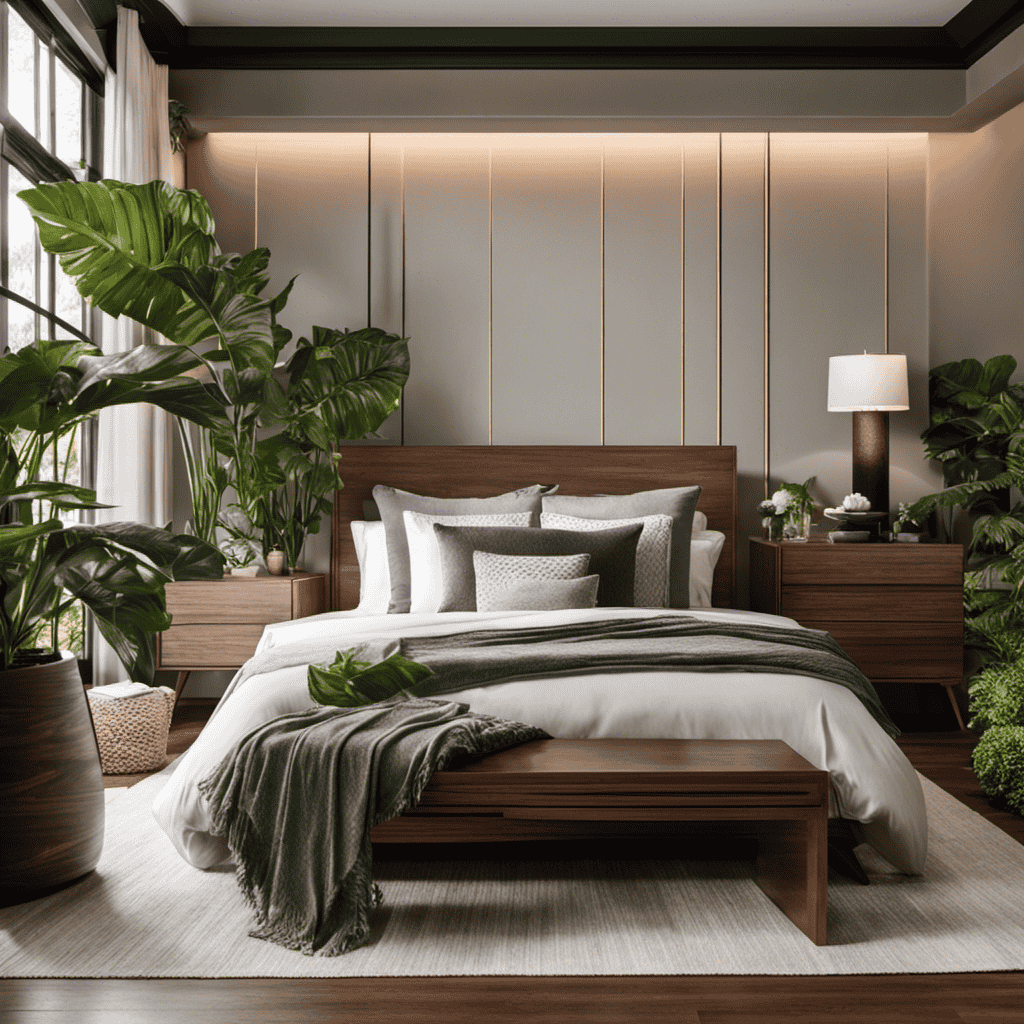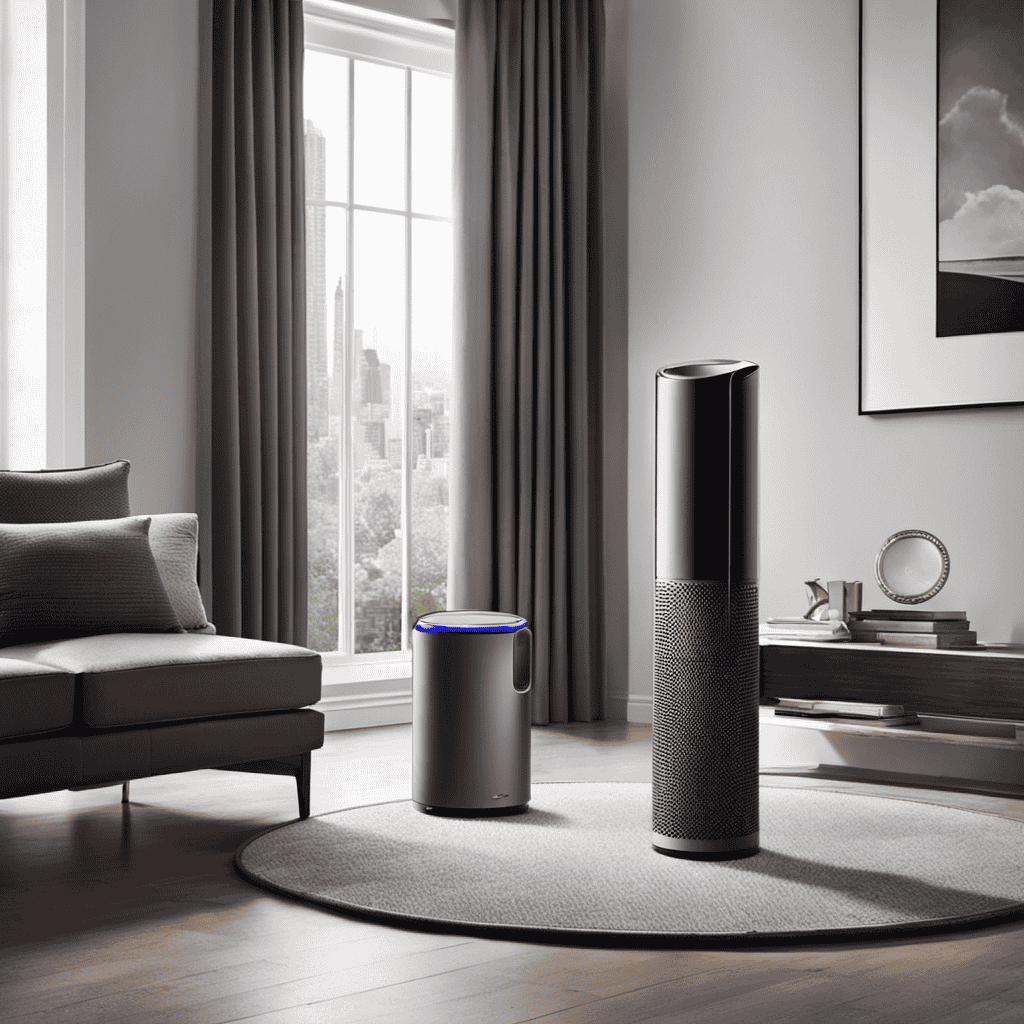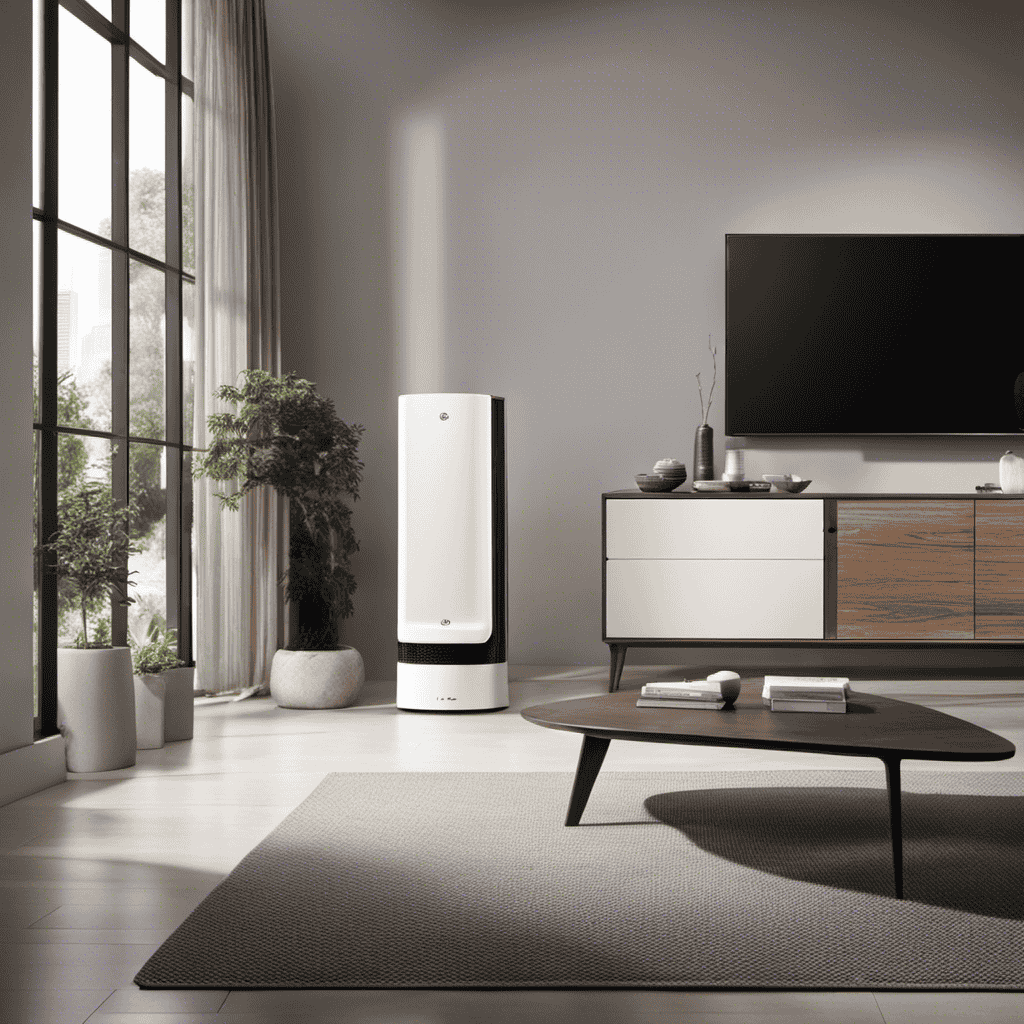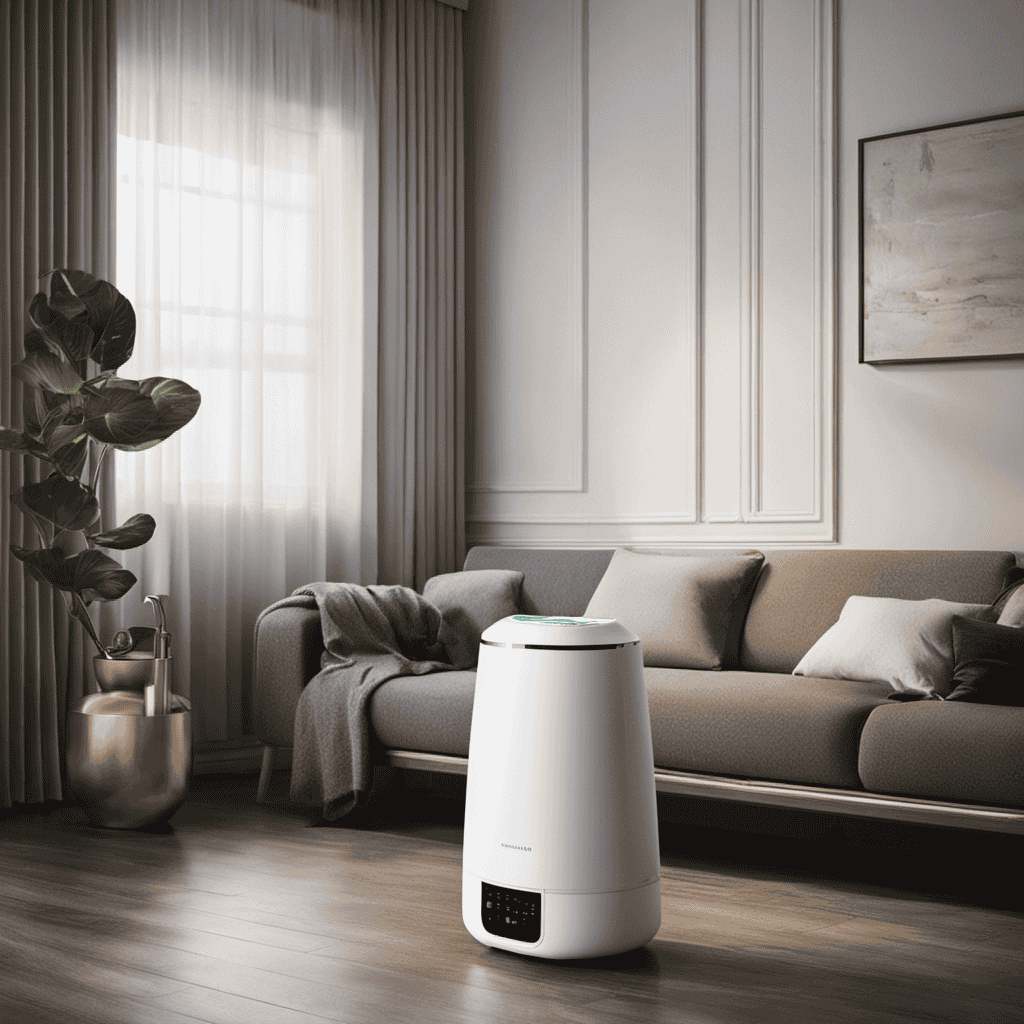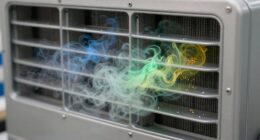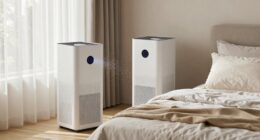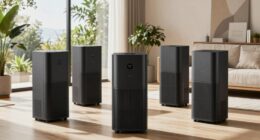You should replace your air purifier filters regularly to maintain peak air quality. For True HEPA and activated carbon filters, aim to replace them every 12 months, or after approximately 8,760 hours of use. Mesh pre-filters need cleaning every 2-4 weeks. However, factors like pollution levels and how often you run your purifier can affect these timelines. Always check your manufacturer's manual for specific guidance. Staying on top of these changes enhances your indoor air quality and overall health. Discover further tips and tricks to keep your air purifier running efficiently and your home's air fresh.
Key Takeaways
- Replace True HEPA and activated carbon filters every 12 months or after 8,760 hours of use for optimal air quality.
- Clean mesh pre-filters every 2-4 weeks to prevent clogging and maintain effective filtration.
- Environmental factors, like pollution levels, can necessitate more frequent filter changes.
- Monitor air quality for real-time data, helping to inform timely filter replacements.
- Consult your air purifier's manual for specific replacement timelines and additional filters needing attention.
Importance of Regular Filter Changes
When it comes to maintaining your air purifier, regular filter changes are fundamental. Clogged filters can greatly reduce filtration effectiveness and indoor air quality. If you're using a HEPA air purifier, it's imperative to replace the HEPA and activated carbon filters every 12 months or after about 8,760 hours of use. This guarantees peak performance in trapping allergens and pollutants.
Additionally, utilizing ozone air purifiers can help in eliminating allergens and odors effectively, complementing the benefits of regular filter changes.
Moreover, don't forget about your mesh pre-filters. Cleaning them every 2-4 weeks is important for effective filter maintenance. Neglecting this task can lead to increased strain on your air purifier, which may shorten its lifespan.
Utilizing filter change indicators can be a game-changer, helping you keep track of when it's time for filter replacement. By staying on top of regular filter changes, you not only enhance indoor air quality but also contribute to the overall health and well-being of everyone in your home.
Reducing allergens and pollutants is essential, and a well-maintained air purifier plays a key role in achieving that goal. So, make those filter changes a priority and breathe easier knowing your air is clean!
Recommended Replacement Timelines

To keep your air purifier running efficiently, adhering to recommended replacement timelines is vital. Regularly replacing your air filters guarantees ideal performance and improves air quality. Here's a breakdown of when to clean or replace filters, depending on the type:
| Filter Type | Replacement Timeline |
|---|---|
| True HEPA Filters | Every 12 months or 8,760 hours |
| Activated Carbon | Every 12 months or 8,760 hours |
| Mesh Pre-Filters | Clean every 2-4 weeks |
| Additional Filters | Consult the owner's manual |
Both HEPA filters and activated carbon filters need to be replaced annually to maintain effectiveness in trapping allergens and odors. Cleaning your mesh pre-filters regularly is important, as neglecting this can lead to clogging and reduce the purifier's efficiency. Depending on your environment—like living in a high-pollution area—you may need to adjust these timelines for filter replacements. Always refer to your specific air purifier's manual for any additional components that might require special attention. Keeping track of these timelines can greatly enhance your indoor air quality.
Steps for Changing Filters

Maintaining your air purifier's efficiency involves not just tracking replacement timelines but also knowing how to change the filters properly. To start, access the filter compartment by opening the designated panel according to your manufacturer's instructions.
Carefully remove the existing filters, taking care to follow specific guidelines to avoid damaging your unit. It's vital to guarantee that the air quality in your home is safeguarded, similar to how home security systems protect your family and belongings.
When you change air filters, it's best to replace your HEPA filters and activated carbon filters simultaneously since they typically have a recommended lifespan of 12 months.
Don't forget to clean the mesh pre-filters every 2-4 weeks using a vacuum or warm water. Verify they're completely dry before reinserting them to maintain best performance.
After you've replaced the filters, reset the filter change indicator. This step is important for keeping track of your replacement schedules and making sure you'll know when to change air filters again.
Benefits of Clean Air

Enjoying clean air brings a host of benefits that enhance your overall well-being and comfort at home. By regularly changing your air purifier filters, you can markedly improve indoor air quality, reducing allergens and pollutants. This leads to better respiratory health, making you feel more comfortable in your own space.
Here's a quick look at some key benefits of maintaining clean air:
| Benefit | Description | Impact on Health |
|---|---|---|
| Improved Respiratory Health | Reduced allergens like dust and pet dander | Fewer allergy symptoms and asthma attacks |
| Enhanced Productivity | Better air quality boosts cognitive functions | Increased focus and efficiency |
| Decreased Pollutants | Clean filters trap harmful particles effectively | Healthier living environment |
| Long-term Effectiveness | Regular maintenance guarantees peak performance | Sustained air quality over time |
| Overall Well-being | Clean air contributes to better mental health | Enhanced mood and relaxation |
Factors Affecting Filter Lifespan

When it comes to your air purifier's filter lifespan, how often you use it plays a big role.
The air quality in your environment, whether indoor or outdoor, can also greatly impact how long the filter lasts. For instance, areas with higher pollution levels may require more frequent changes to maintain ideal performance, similar to geothermal energy's potential in reducing environmental impact.
Plus, the type of filter you choose can affect its durability, so it's important to take these factors into account for ideal performance.
Usage Duration
Air purifier filters have a limited lifespan, and understanding the factors affecting their longevity can help you get the most out of your device. One key aspect is usage duration. If you run your air purifier continuously, you'll need to replace the filters more frequently.
For example, after about 1,400 hours of operation, which is roughly six months with daily use of eight hours, you'll notice a significant drop in effectiveness. Similarly, just as heat pumps require regular maintenance to guarantee efficiency, maintaining your air purifier can prolong its filter life and effectiveness, especially when considering heat pump failures.
Using higher fan speed settings can improve air quality quickly, but it also accelerates filter wear. Increased airflow means your air purifier filter captures more particles, which can lead to quicker degradation.
Environmental factors play a role too; if you live in an area with high outdoor pollution or have indoor sources of contaminants like cooking smoke, your filters will degrade faster.
To extend the lifespan of your HEPA filters, consider regular maintenance of pre-filters. This can reduce the overall particle load, helping you avoid the need to replace a HEPA filter sooner than necessary.
Keeping these factors in mind will guarantee your air purifier remains effective for as long as possible.
Air Quality
Factors like outdoor pollution levels and indoor contaminant sources play an essential role in determining your air purifier filter's lifespan. When you live in an area with high outdoor air pollution, your filter has to work harder to capture the increased volume of particulate matter. This can lead to more frequent replacement filters than in cleaner environments.
Additionally, maintaining a healthy indoor environment through stress management techniques can help minimize the pollutants generated by daily activities, which in turn can extend the lifespan of your filters.
Indoor pollution also considerably affects filter longevity. Activities like cooking, smoking, or having pets can introduce additional contaminants into your home. These sources increase the burden on your HEPA filters, meaning they'll need replacing sooner.
To maximize the life of your filters, consider regular maintenance of pre-filters. By keeping these in good condition, you'll reduce the overall load on your HEPA filters, extending their lifespan.
Filter Type
Choosing the right filter type can greatly impact how long it lasts in your air purifier. Different filters have varying lifespans, which can affect your overall air quality. Here are key factors to take into account:
– Filter Type: True HEPA filters and activated carbon filters generally need replacing every 12 months, while carbon pre-filters should be changed every 3 months. Additionally, maintaining a clean environment can help reduce the frequency of filter changes, as pollutants and allergens increase the load on filters.
For instance, having pets in the household can lead to more dander and hair, akin to how cats display affection for their owners, which may necessitate more frequent replacements.
- Environmental Factors: Outdoor pollution and indoor sources like cooking or smoking can clog filters faster.
- Usage Patterns: The more hours you run your air purifier and the higher the speed settings, the quicker the filters wear out.
- Household Conditions: Homes with pets or allergy sufferers often require more frequent changes due to increased dander, hair, and allergens.
Regularly cleaning mesh pre-filters every 2-4 weeks can also extend the life of your HEPA filters by reducing the initial load of particles they need to capture.
Monitoring Air Quality Effectively
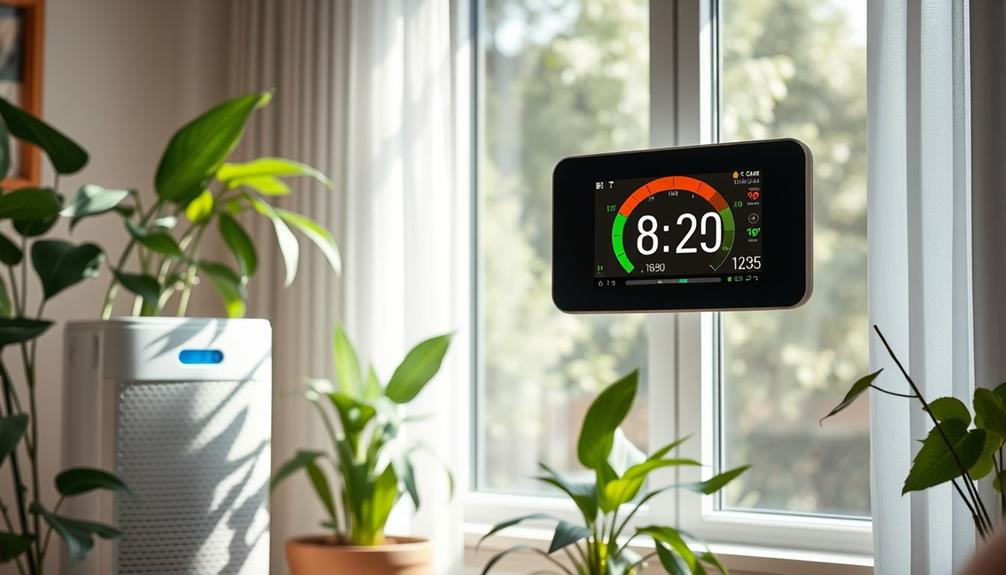
How can you guarantee your indoor air quality stays ideal? The key lies in effective monitoring. Investing in a PM2.5 air quality monitor gives you real-time data on indoor pollution levels. This insight helps you determine the best timing to replace your HEPA filters.
Affordable air quality monitors are essential for evaluating air quality, allowing you to track when filter efficiency diminishes based on particulate levels. Additionally, understanding the importance of music production software can enhance your creative process, just as monitoring air quality enhances your living environment.
Don't forget to keep an eye on outdoor air pollution, too. Understanding when outdoor air quality worsens can alert you to potential increases in indoor particle accumulation, prompting more frequent checks on your filters.
Regularly monitoring air quality can prevent premature or delayed filter changes, providing insights into actual filter performance and the cleanliness of your air. Data-driven recommendations from sources like Smart Air emphasize that you should replace your filters based on usage and environmental conditions, rather than sticking to arbitrary timeframes.
Conclusion
In conclusion, regularly changing your air purifier filters is essential for maintaining clean air in your home. Did you know that a dirty filter can reduce your purifier's efficiency by up to 50%? That's like trying to breathe through a thick blanket! By following the recommended replacement timelines and monitoring your air quality, you can make certain your space remains fresh and healthy. Don't underestimate the power of clean air—your well-being depends on it!


